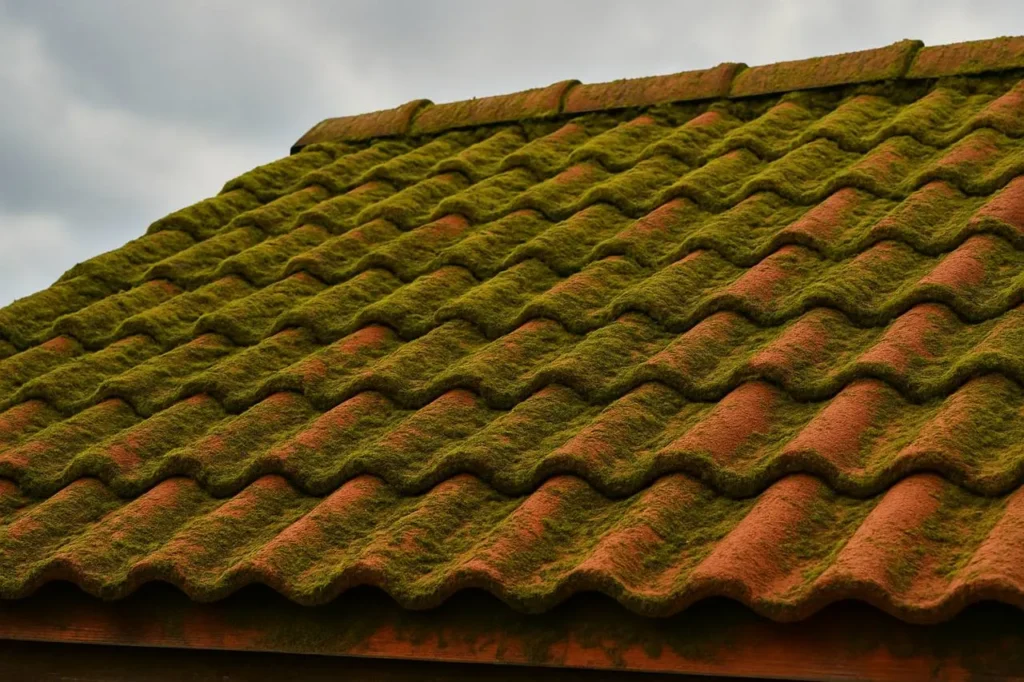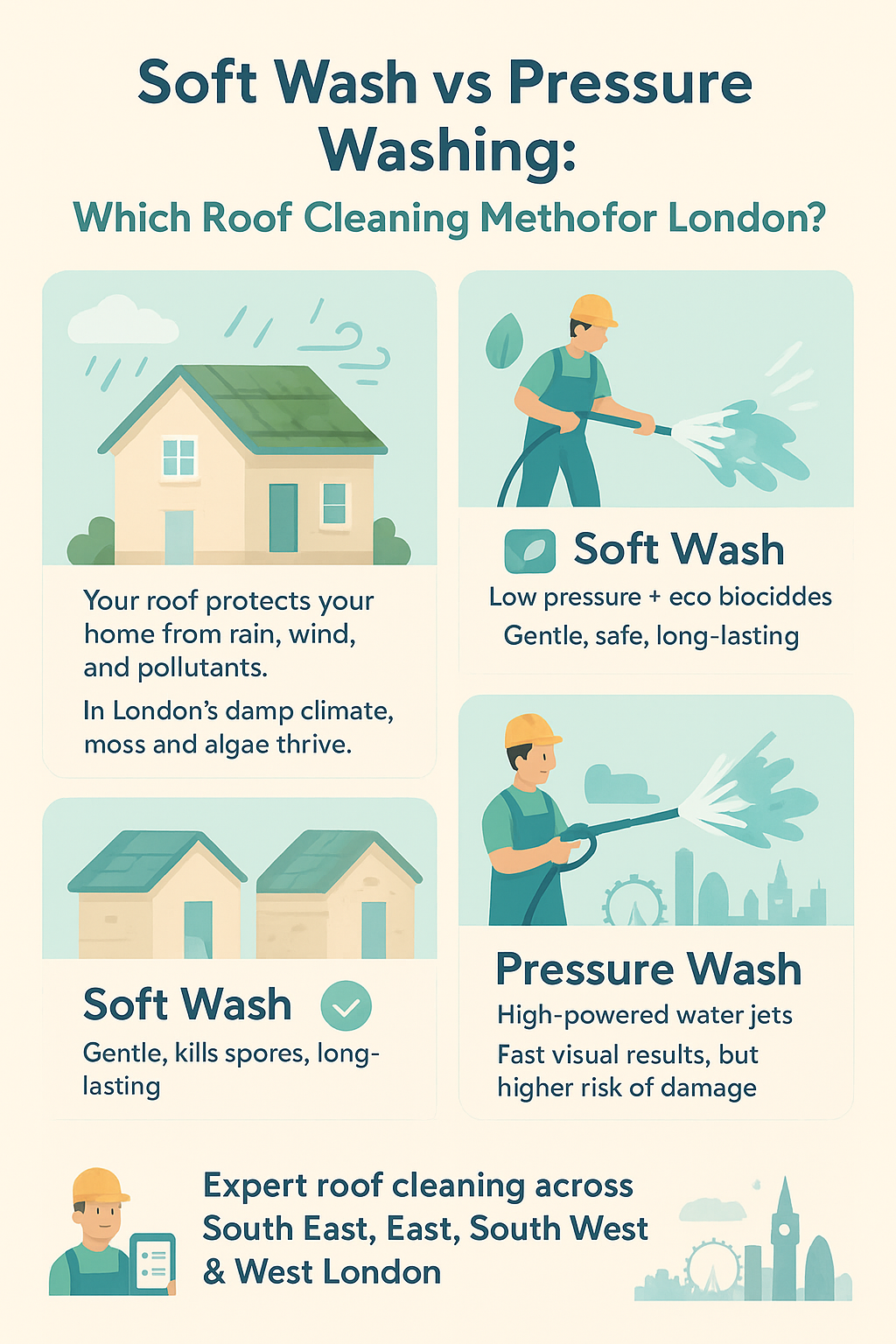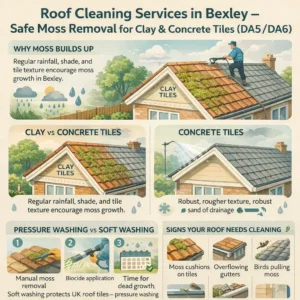Your roof is more than a visual feature — it is the first barrier protecting your home from rain, wind, and pollutants. In London’s damp climate, moss, algae, and lichen thrive, creating both cosmetic and structural problems. At Gutters Gurus, we specialise in expert roof cleaning across South East, East, South West, and West London, and one of the most common questions we receive is: which method is better, soft wash or pressure washing?
Understanding Soft Wash and Pressure Wash
Soft wash roof cleaning in London uses very low water pressure combined with eco-friendly biocides to treat and remove biological growth. This approach is gentle and safe for delicate materials, relying on chemistry rather than brute force. By killing moss, algae, and spores at the root, it delays regrowth and ensures longer-lasting cleanliness.
Pressure washing roof London, by contrast, uses the mechanical force of high-powered water jets to blast away dirt and moss. It can deliver instant visual results but carries a higher risk of erosion, water ingress, and surface damage. Pressure washing does not kill spores, so regrowth often returns more quickly.
Advantages of Soft Wash on Sensitive Roof Materials
London’s housing stock includes clay tiles, concrete tiles, and natural slate — all vulnerable to aggressive cleaning.
Clay tiles and older roofs can chip or crack under pressure.
Slate, common in heritage buildings, fractures easily if mishandled.
Concrete tiles lose their protective surface when blasted, becoming porous and discoloured.
Soft washing avoids these risks. The low-pressure application of biocides penetrates deeply into the pores of roofing materials, neutralising moss and algae without disturbing protective coatings. As a result, roofs stay cleaner for longer, and their structural integrity is preserved.
When Pressure Wash Is Appropriate
Although soft washing is recommended for most London roofs, there are limited scenarios where pressure washing can be considered.
Sturdy, modern materials such as metal roofing or robust concrete tiles may withstand pressure treatment.
Roofs with heavy industrial soiling or thick, stubborn grime may require mechanical removal.
In cases where soft washing cannot fully eliminate surface build-up, controlled pressure may be applied with strict safety precautions.
At Gutters Gurus, we only recommend pressure washing after a full survey and risk assessment. Even then, it is applied carefully, with water directed downwards to avoid forcing moisture under tiles or into the roof void.

Find out more : The Complete Guide to London Roof Cleaning Services
Choosing the Right Method for London Roofs
The choice between soft wash and pressure washing depends on:
Roof type and material: slate, clay, concrete, metal, or flat systems all behave differently.
Roof condition: older or weathered tiles demand extra care.
Slope and access: steep or high roofs require specific safety solutions.
London’s damp weather: moss and algae spread quickly, making long-term protection critical.
Cost versus risk: while pressure may seem cheaper, soft wash reduces the risk of hidden structural damage.
Hybrid Approaches
Sometimes the best solution is a combination. Heavy moss can be scraped away manually, followed by a soft wash to kill spores and prevent regrowth. In other cases, light, spot pressure may be used on tough stains, while the majority of the roof is treated with soft wash. Gutters Gurus often employs these hybrid methods to balance immediate visual results with lasting protection.
Case Examples from London Projects
Across London boroughs, our teams have restored a wide range of roofs, from Victorian slate terraces to modern suburban homes. Before-and-after photographs show dramatic improvements, with dark, moss-covered tiles restored to their original colour. Clients often highlight not only the transformation but also our professionalism: “fast and efficient,” “professional and reliable,” and “highly recommended.” These testimonials demonstrate the trust that London homeowners place in Gutters Gurus to deliver safe, compliant, and lasting results.
Conclusion
In London’s environment, soft wash stands out as the responsible, long-term solution for roof cleaning. Pressure washing has limited applications, but its risks make it unsuitable for most properties. Gutters Gurus combines expertise, eco-friendly products, and strict safety compliance to choose the right method for your roof.
Ready to find out which method is right for your property? Contact Gutters Gurus today for your free consultation and personalised quote.
1: Is soft wash roof cleaning safe for old clay or slate roofs in London?
Yes. Soft washing uses very low pressure and eco-friendly biocides, making it safe for fragile materials like clay, slate, or heritage tiles. It avoids the cracking or chipping risks associated with pressure washing.
2: Can I pressure wash my roof in London?
Pressure washing is only appropriate for certain sturdy materials, such as modern metal or robust concrete tiles. For most London homes, pressure washing carries too much risk of damage and water ingress.
3: How long does a soft wash treatment last?
Because soft washing kills spores at the root, results typically last much longer than pressure washing. Roofs remain cleaner for several years before significant regrowth appears.
4: Does roof cleaning in London include gutter clearing?
At Gutters Gurus, yes. Our roof cleaning packages always include gutter and downpipe clearing to ensure smooth water flow and prevent blockages.
5: What factors affect the cost of roof cleaning in London?
The price depends on property type, number of storeys, the cleaning method, access requirements, and the extent of moss or debris. That’s why Gutters Gurus offers free, itemised quotes after inspection.
6: Is soft wash environmentally friendly?
Yes. We use approved professional-grade solutions applied responsibly, with full runoff management, to ensure safety for your home, garden, and the local environment.
7: How often should I book roof cleaning in London?
Most homes benefit from professional cleaning every 12–18 months. The frequency may be shorter in shaded or damp locations where moss grows quickly.
8: Will cleaning my roof improve property value?
Absolutely. A clean, well-maintained roof improves curb appeal and reassures potential buyers that the property is properly cared for.
Click to book a free appointment



